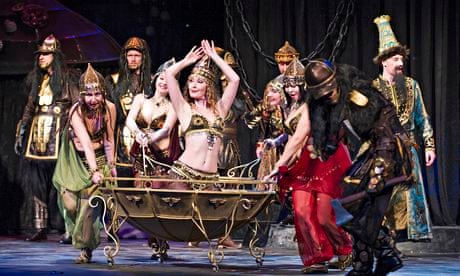On their first visit to the UK, the Kolobov Novaya Opera Theatre of Moscow bring with them a major 19th-century work that British companies seldom tackle. Despite its position close to the heart of the Russian repertory, Borodin's Prince Igor is a problematic piece. Its composer was a professor of chemistry who wrote music in his spare time and left his only opera, on which he had been working for 18 years, unfinished when he died in 1887. His musical associate Rimsky-Korsakov and Rimsky's star pupil, Glazunov, set to work on the fragmentary manuscripts, filling in the blanks and coming up with a viable, if episodic, entity.
Though there have been other attempts to edit the material, it is the Rimsky/Glazunov version that stage director Yuri Alexandrov adapted for his own production, his major intervention being to drop the entire third act – though he's not the first to do so. The staging apparently opened in Moscow a few years back, but it looks, frankly, much older.
Russian opera values its traditions, whose musical and vocal elements provide this show with much of its quality, yet Alexandrov's staging, designed by Vyacheslav Okunev, remains a visual curiosity whose idiosyncrasies are sometimes unintentionally comic. There's an archaic staginess to the sets and costumes that is rarely pleasing and which reaches an apogee of kitsch in the exotic Polovtsian scene, where something mesmerically sensuous is needed but sadly does not materialise. Movement – especially choral movement – is by numbers, and seems painfully fake; faced with an aria or a duet, individual artists stand with their arms wide open and deliver.
It's a shame, because Borodin's score is full of fine things and its musical re-creation under conductor Jan Latham-Koenig deserves a much stronger visual setting; the distinctive sonic qualities of the Russian instrumental tradition come over with impressive character.
So, too, do many of the principal performances – at least from a vocal point of view – though, in this first cast, Vladimir Kudashev's Khan Konchak sounded underwhelming and Elena Popovskaya's undeniably powerful Yaroslavna had shrill moments offsetting her authoritative presence.
More consistent were Aleksey Tatarintsev's gleaming tenor as Vladimir, Sergey Artamonov's fervent Igor, Agunda Kulaeva's vampish Konchakovna and Evgeny Stavinsky's brazen depravity as Igor's treacherous brother-in-law; in a more distinguished production, their potential – and that of the opera as a whole – could have been amply fulfilled.

Comments (…)
Sign in or create your Guardian account to join the discussion